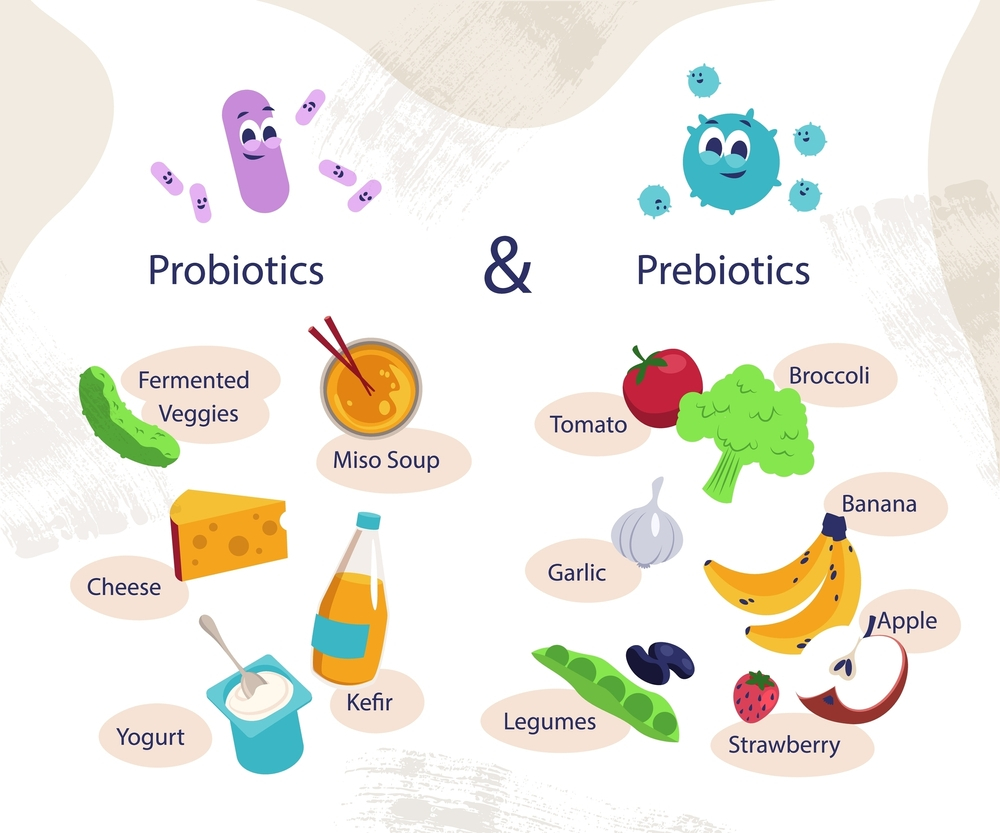The Gut-Brain Connection: Probiotics and Stress Relief Explained

Table of Contents
The gut-brain connection has been a topic of growing interest in the field of health and wellness. Research has shown that the health of the gut can directly impact the functioning of the brain, affecting everything from mood to cognition. In this article, we will delve into the fascinating link between the gut and the brain, focusing on the role of probiotics in stress relief. Join us on a journey to unravel the secrets of the gut-brain axis and discover how probiotics can positively influence our mental well-being.
Understanding the Gut-Brain Connection
Did you know that your gut is often called your second brain? It’s true! There’s a super intricate link between your digestive system and your brain that can affect how you feel every day. When your gut is healthy, it talks to your brain in a way that can make you feel great, but when it’s not, it might actually contribute to feeling stressed or down. That’s why keeping your gut in tip-top shape can be a game-changer for your mood and mental well-being.
The Intricate Relationship Between the Gut and the Brain
Ever heard of the saying, “trust your gut feeling”? Well, it turns out there’s more truth to that than we might think! Our guts and brains are in constant conversation through a complex network known as the enteric nervous system. This system is so incredibly detailed and self-sufficient, it’s often referred to as our “second brain”.
What’s really cool is how the gut sends signals to the brain via the vagus nerve, a superhighway of communication. When our gut is happy, it releases neurotransmitters and other chemicals that can positively affect our mood and emotions. Now that’s what you call a gutsy move!
Impact of gut health on mental well-being
Have you ever had a “gut feeling” about something? It turns out, your gut does a lot more than just help digest food; it could also be playing a part in how you feel. Scientists have found a pretty fascinating link showing that the state of our gut health can have a real effect on our moods and even the way our brains work.
What’s happening down there in our digestive system isn’t staying there—it’s talking to our brain. An unhealthy gut might send out the wrong signals, and this is where things like stress, depression, and anxiety can come into play. On the flip side, take good care of your gut, and it’s like you’re sending your brain a bouquet of “feel-good” messages. It’s all about that balance, and when it’s right, our mental well-being gets a boost.
Introduction to Probiotics

You might have heard a lot about probiotics lately, and that’s for a good reason! Probiotics are like tiny superheroes for your gut, made up of good bacteria and yeast that keep your digestive system happy and healthy. They’re found in lots of yummy foods and supplements, working behind the scenes to make sure everything in your belly is balanced. Imagine them as the peacekeepers of your gut, making sure the bad guys don’t take over and cause trouble.
Definition and Types of Probiotics
Have you ever heard about the tiny helpers inside your body called probiotics? Probiotics are live microorganisms, similar to the good bacteria found in your gut, which are believed to provide a health benefit when consumed in adequate amounts. They are sort of like your body’s silent cheerleaders, working hard to keep your gut world in harmony.
But all probiotics aren’t the same; there are different types, each with their unique job. Most belong to two key groups: Lactobacillus and Bifidobacterium. Lactobacillus might ring a bell if you’re a yogurt fan—it’s often found in yogurts and other fermented foods. It’s quite the digestive helper, especially with lactose, the sugar in milk that sometimes causes stomach woes. On the other hand, Bifidobacterium hangs out in some dairy products and does an awesome job supporting your immune system and managing IBS symptoms.
In a nutshell, these microscopic allies come in various strains, with each one potentially tackling different health challenges. From aiding in digestion to fighting off pesky invaders, they are essential for maintaining a balanced gut—and a balanced you.
How Probiotics Promote Gut Health
Probiotics are like tiny superheroes for your tummy. They are live bacteria and yeasts that are good for your digestive system. We’re not talking about the harmful bacteria that can cause sickness. Nope, these little guys are friendly and help keep your gut in tip-top shape.
Think of your gut as a bustling city where the balance between good and bad guys can mean the difference between peace and chaos. Probiotics help maintain order by ensuring the beneficial bacteria have the upper hand. They wage war against the bad bacteria, which can lead to improved digestion and a stronger gut barrier. This means your body is better at absorbing nutrients and keeping out the bad stuff like toxins and pathogens.
Pretty cool, right? By supporting a balanced gut flora, your strike force of probiotics can also stimulate your immune system, making it more efficient at guarding against intruders. So not only do they give you a digestive advantage, but they also help arm you better against illnesses. It’s a win-win situation for keeping your body feeling awesome.
The Role of Probiotics in Stress Relief

Have you ever felt like your stomach was in knots when you’re worried or stressed? Well, it’s not just in your head! Scientists are uncovering how probiotics—those friendly bacteria in your yogurt—can actually help calm your mind. It turns out that these microscopic helpers might play a big role in making us feel more chill. So, let’s dive into the nitty-gritty of how these tiny organisms help us fight stress.
Effects of Probiotics on Stress and Anxiety
Did you know that the little critters living in your gut can play a big role in how stressed or anxious you feel? It’s true! Probiotics, which are friendly bacteria, have been connected to our mental health in some pretty amazing ways. Studies suggest that these good bacteria can actually help tame the stress beast within us and dial down the anxiety alarms.
When you consume probiotics, they may produce substances that have a calming effect, similar to the way antidepressants work. But instead of popping pills, you’re munching on yogurt or sipping some kombucha. These happy gut bugs might also lower inflammation in the body, which is a big plus since inflammation can lead to all sorts of health issues, including feeling super stressed out. So, by keeping your gut bacteria balanced with probiotics, you could also be keeping your stress and anxiety in check.
Mechanisms through which probiotics reduce stress
Have you ever wondered how these tiny organisms called probiotics can have such a big impact on stress levels? It’s kind of like having a superhero inside your body! Your gut is home to billions of bacteria, and the good ones, which are the probiotics, work hard to keep the balance. When you’re stressed out, not only your brain feels it; your gut does, too.
Probiotics join the battle by communicating with your brain through something called the “vagus nerve.” This nerve is like a two-way radio, sending messages back and forth between your gut and your brain. Imagine probiotics soothing the stressed-out messages that your gut sends to your brain, telling your mind to relax and take it easy. Also, probiotics help in making sure your gut wall is strong, so bad bacteria can’t break through and cause chaos. They also play a cool role in producing some mood-lifting chemicals like serotonin, which can make you feel happier. So, it turns out these little gut buddies can really help you chill out!
Practical Ways to Incorporate Probiotics into Your Diet

Getting those good bacteria into your diet doesn’t have to be a chore. It’s all about knowing which foods are packed with probiotics and how to include them in your meals. Let’s dive in and discover how you can get started on boosting your gut health, and the payoff is big: a happier mind could be just a few bites away!
Foods Rich in Probiotics
Probiotics are like your gut’s best friends; they’re live bacteria that are actually good for your health, especially your digestive system. They’re found in a bunch of different foods and can be a tasty way to boost your gut health. Imagine having a superhero squad in your belly, fighting off bad guys, and keeping the peace—that’s what probiotics do!
Yogurt stands out as a champion among probiotic foods. It’s not only delicious but also packed with friendly bacteria that can help keep your digestive system running smoothly. Just make sure to check for live cultures in the ingredients list to get the benefits. Another superhero in the probiotic foods world is kefir, a fermented drink that’s like a tangy smoothie, chock-full of gut-loving cultures.
If you’re feeling adventurous, give sauerkraut and kimchi a try. These fermented veggies are not just probiotic powerhouses, but they also add a zing to your meals. Pickles can also join the party—if they’re brined in saltwater, not vinegar, ‘cause that’s where the good bacteria like to hang out.
For the cheese lovers out there, certain types like Gouda, Cheddar, and Swiss can earn you some probiotic points as well. These aren’t just tasty – they’ve got the good stuff built right in. Tempeh, a fermented soybean product, is another probiotic hero that brings a nutty flavor to the table along with its friendly bacteria.
And let’s not forget about miso and sourdough bread! A bowl of miso soup can warm you up and give your gut a helping hand at the same time. It’s a win-win! Sourdough bread, with its signature taste, has a starter that’s loaded with probiotic potential.
To sum it up, you’ve got a bunch of tasty options to get those probiotics into your diet. Happy belly, happy you!
Supplements and Probiotic Products
Sometimes, getting enough probiotics from food alone can be tricky. That’s where supplements and probiotic products come in. They’re a convenient boost for your gut, especially if you’re always on the go. These supplements come in various forms, such as capsules, powders, and liquids, and they’re packed with beneficial bacteria.
Choosing the right probiotic supplement can feel overwhelming, but it’s all about the strains and the CFU count—that’s colony-forming units, telling you how much good bacteria you’re getting. Look for products with a variety of strains and a CFU count in the billions to really make a difference. And remember, always check with a healthcare provider before starting any new supplement, just to be safe and sure it’s the right choice for you.
Exploring the potential of probiotics in combating stress and promoting mental well-being
You’ve probably heard of probiotics being good for your stomach, right? But the cool part is that they’re also little warriors in the fight against stress and not-so-great moods. It’s like having an army of tiny friends inside you that are all about keeping you calm and happy.
Probiotics step in and send out positive signals to your brain, making it chill out a bit. This could mean saying goodbye (or at least “see you later”) to feeling anxious and stressed. They’re kind of like a natural chill pill, but without the pill part. And the best thing? They could help your brain stay sharp and focused, which is pretty awesome, especially during those tough test weeks or when life’s just throwing too much at you. So next time you’re feeling the pressure, just remember that these little gut buddies might just have your back!
Embracing the gut-brain connection for holistic health
To fully embrace the gut-brain connection is to take a wholistic approach to health. See, your body isn’t just a bunch of separate parts doing their own things; it’s a carefully tuned system where each piece talks to the rest. The chat between your belly and your brain is a big deal—it can determine how you feel day-to-day. By nurturing this connection through the foods we eat—especially those packed with good bacteria—we’re doing way more than just keeping our digestion smooth; we’re fine-tuning our mental engine too!
Now, think of holistic health like a cool puzzle. When all the pieces fit just right, the picture is clear and complete. Paying attention to that gut-brain chat is like finding a missing puzzle piece. It’s not just about exercises for your body or mind alone; it’s about keeping the conversation between the two smooth and friendly. Probiotics are kind of like the peacekeepers, ensuring that both sides—your brain and gut—are working together for your best health. By making sure these tiny helpers are part of your diet, you help every part of you to work better, making you feel awesome inside and out.
Conclusion
As we conclude our exploration of the gut-brain connection and the stress-relieving potential of probiotics, it becomes clear that fostering a healthy gut is essential for nurturing a healthy mind. By incorporating probiotics into our daily routine, we take a step towards harmonizing the intricate relationship between our gut and brain, paving the way for improved well-being and resilience to stress. Let’s continue to unlock the power of the gut-brain axis and embrace the profound impact it can have on our overall health and happiness.
FAQs
1. How does the gut-brain connection work?
- The gut-brain connection, also known as the gut-brain axis, refers to the bidirectional communication between the gastrointestinal tract and the brain. This communication occurs through neural, hormonal, and immunological pathways, influencing various physiological and psychological functions.
2. How does a probiotic help with stress?
- Probiotics are beneficial bacteria that, when consumed, can positively influence the balance of microorganisms in the gut. These microorganisms play a role in producing neurotransmitters and other signaling molecules that can impact mood and stress responses, thereby potentially alleviating stress.
3. What is the role of probiotics in the gut-brain axis?
- Probiotics play a crucial role in modulating the gut-brain axis by promoting a healthy balance of gut microbiota. This balance can affect the production of neurotransmitters, such as serotonin, and influence the immune system, contributing to overall mental and emotional well-being.
4. What is the connection between the gut and anxiety?
- The gut and anxiety are interconnected through the gut-brain axis. Disruptions in gut microbiota can impact the production of neurotransmitters and inflammatory factors, potentially contributing to the development or exacerbation of anxiety.
5. How does gut bacteria affect anxiety?
- Gut bacteria can influence anxiety by producing neurotransmitters, regulating inflammation, and interacting with the central nervous system. Imbalances in gut microbiota may lead to alterations in these processes, contributing to anxiety symptoms.
6. What is the relationship between stress and gut health?
- Stress can negatively impact gut health by altering the composition of gut microbiota, increasing inflammation, and affecting the integrity of the intestinal barrier. Conversely, a healthy gut can help modulate the body’s response to stress.
7. Is there a relationship between gut bacteria and stress?
- Yes, there is a relationship between gut bacteria and stress. The composition of gut microbiota can influence stress responses, and stress, in turn, can affect the balance of gut bacteria. This bidirectional relationship is a key aspect of the gut-brain axis.
8. What gut bacteria helps with stress?
- Certain strains of probiotics, such as Lactobacillus and Bifidobacterium, have been studied for their potential to modulate stress and anxiety. These bacteria may contribute to a healthier gut environment and influence the production of mood-regulating neurotransmitters.
9. How do you release stress from your gut?
- To release stress from your gut, focus on maintaining a balanced and healthy lifestyle. This includes adopting a diet rich in fiber, consuming probiotic-rich foods, staying hydrated, regularly exercise, and practicing stress-reduction techniques such as mindfulness, meditation, and adequate sleep. These lifestyle factors can positively impact both gut health and overall well-being.
Useful resources
For more information on the gut-brain connection, probiotics, and stress, consider checking reputable sources such as:
- Mayo Clinic – Gut-Brain Connection:
- Harvard Health Publishing – The Gut-Brain Connection:
- National Center for Complementary and Integrative Health – Probiotics:
- PubMed – Gut Microbiota and Mental Health:








Can you be more specific about the content of your article? After reading it, I still have some doubts. Hope you can help me.